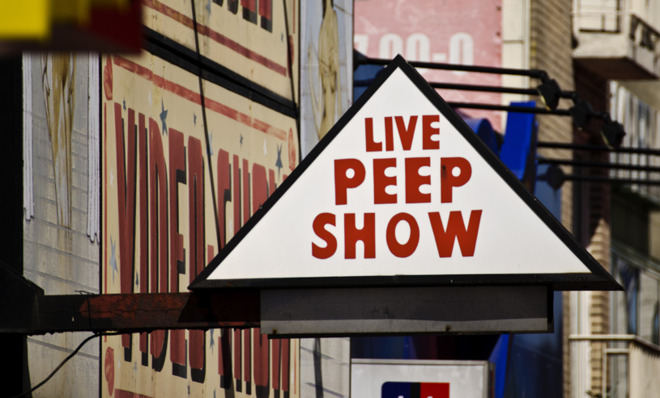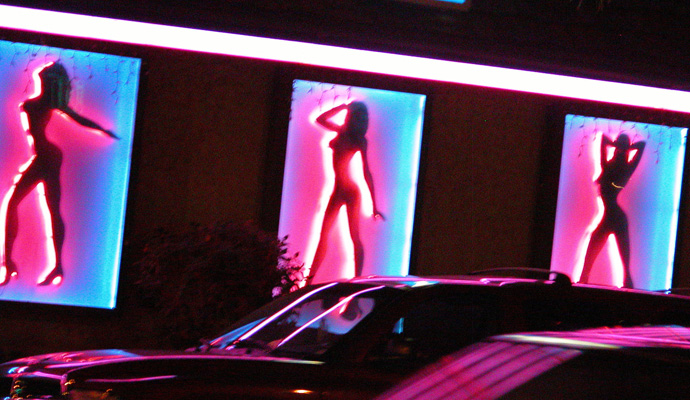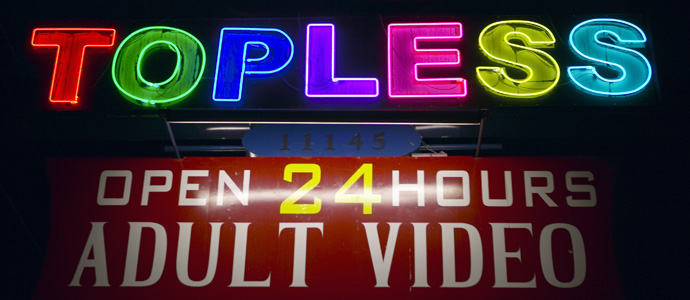New York City's last peep shows
Times Square may be a G-rated tourist temple, but an avenue away, the "live girls" aren't going anywhere

A free daily email with the biggest news stories of the day – and the best features from TheWeek.com
You are now subscribed
Your newsletter sign-up was successful

As you walk up Eighth Avenue near Times Square, the first thing you notice is that you're in the virtuous shadow of the area's namesake institution, the steely-grey New York Times building, which looms on your right. You breathe in the scent of Schnipper's burgers and fries, complemented by the familiar odor of a double-decker tour bus' diesel fumes. And despite your utter hatred of Midtown crowds, you continue north toward 42nd.
Upon hitting a critical mass of tourists on the corner, you're forced to dart west across the street, because you're on a mission. Now you're the clichéd salmon swimming upstream, as you'll certainly be pummeled by the legions of commuters heading straight for the Port Authority Bus Terminal to make their 6:07 back to Weehawken or Rahway or Fort Lee or some other place you thank your lucky stars you've never set foot in. Yet, you know this is false snobbishness, because you're from Long Island, a roughly parallel universe of only slightly better repute.
(More from Narratively: A water-level view of New York harbor)
The Week
Escape your echo chamber. Get the facts behind the news, plus analysis from multiple perspectives.

Sign up for The Week's Free Newsletters
From our morning news briefing to a weekly Good News Newsletter, get the best of The Week delivered directly to your inbox.
From our morning news briefing to a weekly Good News Newsletter, get the best of The Week delivered directly to your inbox.
You've got just one worry at this moment: as you approach your destination, you're afraid that one of these suits or biz-casual bros knows you from college, or one of these H&M-bag-clutching, flip-flop-and-jeans-sporting girls is an old camp "friend" or acquaintance. It would be worse yet if you ran into a family friend, or, at the most dire end of the spectrum, a relative, during those two seconds of awkwardness when you leave this world and enter another.
With one final gulp of burger-diesel-and-nicotine-scented air, you make a sharp and abrupt left turn into the establishment with the window sign that reads "LIVE NUDE GIRLS."
You never break stride.
* * *
A free daily email with the biggest news stories of the day – and the best features from TheWeek.com
Ever since Giuliani took office, it has been rumored that New York's peep shows have months to live. But here it is, Gotham City, palace of porn, alive and kicking, and shaking its sultry hips on the corner of Eighth and 43rd.
Elizabeth Thomas, Deputy Director of Communications for the New York City Law Department, explained the history of peep show regulation via email. (Author's note: The following is not intended to be Kafkaesque, but it most certainly is.)
Between 1984 and 1993, the number of adult bookstores, peepshows, and video stores increased from 29 to 86 establishments across New York City. (This is, presumably, due to the increase in VHS availability.) In 1995, the City of New York adopted "adult use zoning regulations," which more or less prohibited "adult establishments" (strip clubs, topless bars, peep shows, etc.) from being located in any "zoning district where residential uses are permitted, and prevented them from existing within 500 feet of a school, place of worship, another adult establishment, or a zoning district where adult uses are prohibited." So, basically, peep shows were outlawed almost everywhere.
But, as is the case with many American laws, there are loopholes. While the city was initially successful in obtaining "temporary closing orders" for these businesses, many of the targeted unsavory establishments evaded enforcement.

Loophole No. 1: So as not to harm legitimate book and video stores that featured small sections devoted to adult entertainment, the 1995 regulations defined adult bookstores as those with at least 40 percent of their stock or floor space dedicated to adult materials. To get around this regulation, adult video stores filled their basements or upper floors with numerous copies of cruddy, decidedly non-racy films that would never sell. (Think Class of Nuke 'Em High or Garbage Pail Kids: The Movie.)
(More from Narratively: The war over classical music)
Loophole No. 2: "Adult eating or drinking establishments" and "adult theaters" were defined in the 1995 regulations as clubs and theater-restaurants that "regularly feature" adult entertainment. Again, this wording wasn't crystal clear, and the adult clubs and theaters evaded enforcement by putting up partitions that restricted adult entertainment to less than 40 percent of their overall floor area. While some courts agreed with the city's view that this was nonsense, the New York Court of Appeals did not adopt the city's interpretation of the law.
By 2000, more than a third of the adult establishments in Manhattan had shuttered, and the decline in the Times Square area was even more pronounced. But thanks to the loopholes, many still hung on. Then, in 2001, the law was amended to make clear that any club or theater that regularly features adult entertainment in any portion of the premises is an "adult establishment."
These changes, of course, brought legal challenges from the adult entertainment world. Two lawsuits, For the People Theaters v. City and Ten's Cabaret v. City, challenged the new definitions. These suits were brought forth on behalf of a coalition of adult venues by a lawyer named Herald Price Fahringer, now in his 70s. Though he never looks at pornography (and doesn't drink or smoke either), Fahringer has been representing individuals and organizations accused of lewd behavior since 1963 — and he still is, from a small and tidy office on East 56th Street off Park Avenue.
Fahringer represented Hustler magazine publisher Larry Flynt during his famed obscenity trial in 1978, when Flynt and his local lawyer, Gene Reeves, Jr., survived an assassination attempt outside a Georgia courthouse. Fahringer, busy preparing his closing statement that day, had declined to accompany the pair outside to lunch.
"They told me to get out of town immediately, and had two State Troopers guarding me, but I insisted upon waiting for Larry to get out of critical condition," Fahringer said in his office recently.
Born and raised in Williamsport, Pennsylvania, Fahringer has a farmboy tone, with a slow cadence like Andy Griffith on Matlock. His voice is a bit raspy, but soothing still. He would seem the perfect narrator to tell bedtime stories to children.
(More from Narratively: The making of a model)
"The driving force here is the First Amendment," he added. "People who do not like this material, do not enjoy it, the simple answer is they don't have to go into the stores to buy it and see it. Those who do want these materials should have them available."

Led by Fahringer, the adult world won once again. In October 2003, the State Supreme Court ruled the 2001 amendments unconstitutional because, as Justice Louis B. York wrote, "the City did not do a new study to determine whether the so-called 60-40 establishments have an adverse secondary impact on their neighborhoods."
The tide turned once again in 2005, when an appeals court ruled in favor of the city, but later that year, the Court of Appeals reversed its grant of judgment and sent the matter back to Justice York. (If nothing else, learning about this situation makes you extremely glad that you rejected your mother's advice that you become a lawyer.)
At the subsequent trial, the city successfully proved that despite compliance with the 60/40 formula, these "adult" businesses continued to emphasize and promote sexually explicit entertainment. Then, as expected, the pro-porno forces appealed the decision.
Justice York, who, surprisingly, had not yet died of boredom or checked himself in to an insane asylum, was assigned to further analyze the cases. It was 2011 — the latest legal battle had dragged on for nearly a decade.
On August 30, 2012, the judgment came down in flavor of the plaintiff, a.k.a. the porn-lobby.
The city will, of course, appeal, and you can bet your bottom dollar that the pro-porno legal teams threw a party to celebrate another ten years of fee collection.
Read the rest of this story at Narratively.
Narratively is an online magazine devoted to original, in-depth and untold stories. Each week, Narratively explores a different theme and publishes just one story a day. It was one of TIME's 50 Best Websites of 2013.
-
 How the FCC’s ‘equal time’ rule works
How the FCC’s ‘equal time’ rule worksIn the Spotlight The law is at the heart of the Colbert-CBS conflict
-
 What is the endgame in the DHS shutdown?
What is the endgame in the DHS shutdown?Today’s Big Question Democrats want to rein in ICE’s immigration crackdown
-
 ‘Poor time management isn’t just an inconvenience’
‘Poor time management isn’t just an inconvenience’Instant Opinion Opinion, comment and editorials of the day